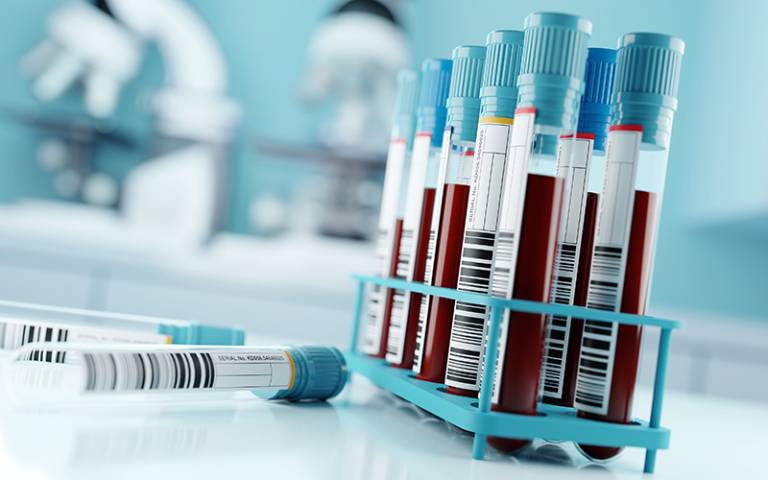Blood tests for diagnosing dementia to be offered in UK trial
4 April 2024
Thousands of people in the UK are to take part in countrywide trials to identify accurate and quick blood tests that can diagnose dementia, led by research teams at ×î×¼µؤءù؛د²تآغج³ and Dementias Platform UK, based at the University of Oxford.

The trials will capitalise on recent breakthroughs in potential dementia blood tests to generate the evidence needed for them to be used in the NHS within the next five years.
Together, the research teams make up the Blood Biomarker Challenge - a multi-million-pound award given by Alzheimer’s Society, Alzheimer’s Research UK, the National Institute for Health and Care Research and Gates Ventures, including آ£5m raised by players of the People’s Postcode Lottery. The project aims to revolutionise dementia diagnosis.
Both teams will recruit participants from sites spread across the country, to ensure their findings are applicable to the whole of the UK’s diverse population.
Timely and accurate diagnosis of the diseases that cause dementia, such as Alzheimer’s disease, is crucial as it means people can access vital care and support and take part in medical research. This will be even more imperative if new treatments are approved for use in the NHS, as these work best for people in the earliest stage of their disease.ج
Currently, people are usually diagnosed using memory tests and brain scans. These are less accurate than â€کgold standard’ tests like PET scans or lumbar punctures, which can confirm what type of dementia they have. However, only 2% of people can access these specialist tests.
In recent years, a number of different blood tests that can diagnose Alzheimer’s disease and other causes of dementia have shown very promising results in research settings. But they have yet to be tested widely in clinical settings in the UK.ج
Led by Professor Jonathan Schott (×î×¼µؤءù؛د²تآغج³ Queen Square Institute of Neurology, honorary consultant neurologist at ×î×¼µؤءù؛د²تآغج³H, and Chief Medical Officer at Alzheimer’s Research UK)جand Dr Ashvini Keshavan (×î×¼µؤءù؛د²تآغج³ Queen Square Institute of Neurology), the Alzheimer's Disease Diagnosis and Plasmaجp-tau217ج(ADAPT) teamجwill focus on the most promising biomarker for Alzheimer’s disease, called p-tau217.
This reflects levels of two hallmark proteins found inside the brain in Alzheimer’s disease – amyloid and tau. The researchers will carry out a clinical trial to see whether measuring p-tau217 in the blood increases the rate of diagnosis for Alzheimer’s disease both in people with early dementia, but also in those with mild, progressive problems with memory.
Professor Schott said: “An early, accurate diagnosis of Alzheimer’s disease is already important, allowing people to access appropriate care and medications. If, as we hope, new treatments that can slow down Alzheimer’s disease become available soon, then this will be vital.
"This would pave the way for fair and equitable access to new and potentially life-changing treatments to all who might benefit.â€
The Real World Dementia Outcomes (READ-OUT)جteam will be led by Dr Vanessa Raymont,جAssociate Director atجDementias Platform UK and a Senior Clinical Researcher at the University of Oxford, alongside other researchers including some from the University of Cambridge.
They will test multiple existing and novel blood tests, looking at a range of types of dementia, including Alzheimer’s disease, vascular dementia, frontotemporal dementia, and dementia with Lewy bodies. The researchers will also look at whether blood tests can help detect these diseases at various stages.
Dr Raymont said: “Since I first stepped into a memory clinic 30 years ago there has thankfully been a shift in the way society thinks about dementia. There was previously a feeling that this was just another part of ageing, but now we’re seeing that people want to know more about their condition and they want a diagnosis as it helps them access the support they need.
"Both my parents lived with dementia so I know firsthand the devastation this disease causes, and how a timely and accurate diagnosis can benefit people and their families.â€
These complementary approaches will maximise the chances of providing the evidence needed to prove that blood tests are ready for use in the NHS, and will pave the way for them to be made available within the next 5 years.
With more than half of all local authority districts in England failing to meet the government’s target dementia diagnosis rate of 66.7%, and with new drugs on the horizon which appear to slow early Alzheimer’s disease, experts from both charities and the research teams agree that change is needed.
Fiona Carragher, Director of Research and Influencing at Alzheimer’s Society, said:ج“At the moment only 2% of people with dementia can access the specialised tests needed for a diagnosis, leading to unnecessary delays, worry and uncertainty. Blood tests are part of the answer to this problem – they’re quick, easy to administer and cheaper than current, more complex tests.
"I’ve spent decades working in research and the NHS and, after years of slow progress, it feels like we’re on the cusp of a new chapter on how we treat dementia in this country."
And Dr Sheona Scales, Director of Research at Alzheimer’s Research UK, added: “We’ve seen the enormous potential that blood tests are showing for improving the diagnostic process for people and their loved ones in other disease areas. Now we need to see this same step-change in dementia, which is the greatest health challenge facing the UK.
“It’s fantastic that through collaborating with the leading experts in the dementia community, we can look to bring cutting-edge blood tests for diagnosing dementia within the NHS. And this will be key to widening access to groundbreaking new treatments that are on the horizon.â€
Links
Image
- °ن°ù±ً»ه¾±³ظ:جج(¾±³§³ظ´ا³¦°ى)
Media contact
Tom Cramp
·،:جt.cramp@ucl.ac.uk
 Close
Close

